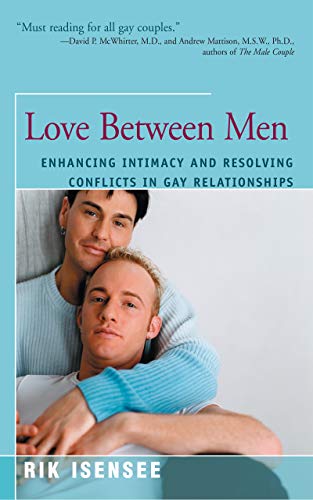How to Approach Conflict:
and come out feeling better on the other side!

Even though we're gay, we're still socialized as men, often with a competitive edge to arguing about who's "right" rather than really sharing what's at stake for us. I put this intro together as a brief guide to approaching conflict with greater confidence that we'll make the situation better, instead of making it worse.
Blending Stage
When guys first start dating, thereʼs often a sense of putting your best foot forward and a willingness to enter each otherʼs world: “whatever pleases you, pleases me.” This can be a wonderful “blending” stage in a relationship, where differences are minimized and you “go along to get along.”
Reclaiming Yourself as an Individual
Yet over time, there can be a yearning to reclaim yourself as an individual: wanting to see some friends, or engage in activities you may have neglected in the initial throes of getting to know someone.
If youʼre not both on the same schedule, though, in terms of your readiness to "reclaim" yourself, one guyʼs effort to regain some balance in his life can be experienced as distancing by his partner, who wonders whatʼs going on. Often this can lead to a misunderstanding, or even a first major argument.
Some guys, in order to protect themselves, will figure “well if thatʼs how you are, Iʼm out of here.”
Or they may both be so rattled by this disruption, that they donʼt really talk it through; and instead, neither of them brings it up again. Couples sometimes form an implicit agreement to avoid certain topics because they're afraid of making things worse. Unfortunately, avoiding conflict can lead to larger and larger areas in which it feels unsafe to tread.
The True Source of Boredom
Ironically, I suspect this reluctance to address underlying conflict is the real source of boredom in many relationships: boredom arises not because we know each other too well, but because there are so many areas of discussion that are off-limits.
We then have increasingly fewer topics it feels safe to talk about, without fear of getting into another argument. Instead of engagement, comfort, or excitement, you can end up feeling as though youʼre walking on eggshells; or through a minefield!
Blending Stage
When guys first start dating, thereʼs often a sense of putting your best foot forward and a willingness to enter each otherʼs world: “whatever pleases you, pleases me.” This can be a wonderful “blending” stage in a relationship, where differences are minimized and you “go along to get along.”
Reclaiming Yourself as an Individual
Yet over time, there can be a yearning to reclaim yourself as an individual: wanting to see some friends, or engage in activities you may have neglected in the initial throes of getting to know someone.
If youʼre not both on the same schedule, though, in terms of your readiness to "reclaim" yourself, one guyʼs effort to regain some balance in his life can be experienced as distancing by his partner, who wonders whatʼs going on. Often this can lead to a misunderstanding, or even a first major argument.
Some guys, in order to protect themselves, will figure “well if thatʼs how you are, Iʼm out of here.”
Or they may both be so rattled by this disruption, that they donʼt really talk it through; and instead, neither of them brings it up again. Couples sometimes form an implicit agreement to avoid certain topics because they're afraid of making things worse. Unfortunately, avoiding conflict can lead to larger and larger areas in which it feels unsafe to tread.
The True Source of Boredom
Ironically, I suspect this reluctance to address underlying conflict is the real source of boredom in many relationships: boredom arises not because we know each other too well, but because there are so many areas of discussion that are off-limits.
We then have increasingly fewer topics it feels safe to talk about, without fear of getting into another argument. Instead of engagement, comfort, or excitement, you can end up feeling as though youʼre walking on eggshells; or through a minefield!


